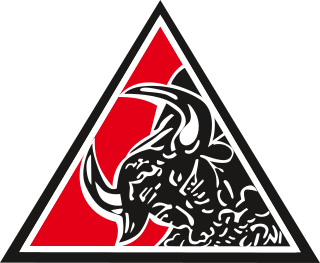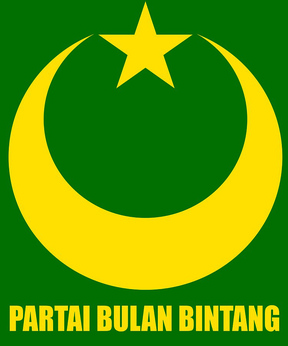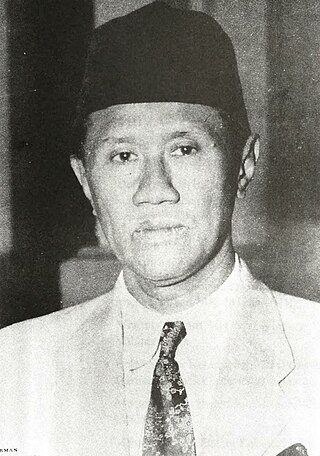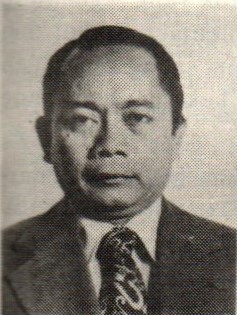
The United Development Party is an Islamist political party in Indonesia. Due to its distinctive logo, the party is known as the "Kaaba Party".

Nahdlatul Ulama is an Islamic organization in Indonesia. Its membership numbered over 95 million in 2021, making it the largest Islamic organization in the world. NU is also a charitable body funding schools and hospitals as well as organizing communities to help alleviate poverty.

The Indonesian National Party was the name used by several nationalist political parties in Indonesia from 1927 until the 2000s. The first PNI was established by future President Sukarno. After independence, the new PNI supplied a number of prime ministers, and participated in the majority of cabinets in the 1950s and 1960s. The party was fused into the Indonesian Democratic Party in 1973. In the years following the reforms of the late 1990s, a number of parties claiming to be the continuation of previous PNIs stood in elections, but gained only a handful of seats.

The Crescent Star Party is a political party in Indonesia.

Muhammadiyah ; officially Muhammadiyah Society is a major Islamic non-governmental organization in Indonesia. The organization was founded in 1912 by Ahmad Dahlan in the city of Yogyakarta as a reformist socioreligious movement, advocating ijtihad - individual interpretation of Qur'an and Sunnah, as opposed to Taqlid - conformity to the traditional interpretations propounded by the ulama. Since its establishment, Muhammadiyah has adopted a reformist platform mixing religious and secular education, primarily as a way to promote the upward mobility of Muslims toward a 'modern' community and to purify Indonesian Islam of local syncretic practices. It continues to support local culture and promote religious tolerance in Indonesia, while a few of its higher education institutions are attended mostly by non-Muslims, especially in East Nusa Tenggara and Papua provinces. The group also runs a large chain of charity hospitals, and operated 128 universities as of the late 1990s.

Oemar Said Tjokroaminoto, better known in Indonesia as H.O.S. Tjokroaminoto, was an Indonesian nationalist. He became one of the leaders of the Islamic Trade Union, founded by Samanhudi, which became Sarekat Islam, which they both cofounded.

This is the Timeline of Indonesian National Revolution

The Council of Indonesian Muslim Associations, better known as the Masyumi Party, was a major Islamic political party in Indonesia during the Liberal Democracy Era in Indonesia. It was banned in 1960 by President Sukarno for supporting the PRRI rebellion.

Burhanuddin Harahap was an Indonesian politician and lawyer who served as prime minister of Indonesia from August 1955 until March 1956. He was a member of the Masyumi Party and served as Minister of Defense concurrently with his tenure as prime minister. Afterwards, he took part in the unsuccessful Revolutionary Government of the Republic of Indonesia (PRRI) rebellion in West Sumatra.

Sjafruddin Prawiranegara was an Indonesian statesman and economist. He served in various roles during his career, including as head of government in the Emergency Government of the Republic of Indonesia, as Minister of Finance in several cabinets, and as the first Governor of Bank Indonesia. Sjafruddin later became the prime minister of the Revolutionary Government of the Republic of Indonesia, a shadow government set up in opposition to the country's central government.

Soekiman Wirjosandjojo was an Indonesian politician and physician who served as prime minister of Indonesia from 1951 until 1952. A member of the Masyumi Party, he also served as the party's first chairman.

Indonesian Islamic Union Party was an Islamic political party in Indonesia before and after independence. In 1973 it was merged into the United Development Party.

Mohammad Roem was an Indonesian politician and diplomat. He served in various positions during his career in government, including as Minister of Home Affairs, Minister of Foreign Affairs, and Deputy Prime Minister of Indonesia. He played a central role in negotiating the Roem–Van Roijen Agreement during the Indonesian National Revolution (1945–1949), which laid the groundwork for the Dutch-Indonesian Round Table Conference wherein the Dutch finally recognized the sovereignty of Indonesia.

Teuku Mohammad Hasan was an Indonesian politician and national hero from Aceh, who served as the first and only governor of Sumatra from 1945 until 1948. He also served as a cabinet minister in Sjafruddin Prawiranegara's emergency cabinet and was a member of both the Senate of the United States of Indonesia (USI) and the Provisional People's Representative Council (DPRS) of the Republic of Indonesia.

Fakih Usman was an Indonesian Islamic leader and politician of the Masyumi Party. He twice served as the Minister of Religious Affairs under the cabinets of Abdul Halim and Wilopo from January until September 1950, and again from 1952 until 1953. In his early years, Fakih was criticized by conservative Muslims for his involvement with the modernist Islamic Muhammadiyah organization, though he is remembered fondly by the group. Born to a merchant and his wife in Gresik, Dutch East Indies, Fakih studied with his father and at a series of pesantren until the 1920s.

The Indonesian Muslims' Party, better known by the syllabic abbreviation Parmusi, was an Islamic political party in Indonesia which existed from 1968 until 1973. Founded as the legal successor to the Masyumi Party, it came fourth in the 1971 Indonesian legislative election, winning 5.36% of the vote and 24 seats in the People's Representative Council. In 1973, Parmusi was merged into the United Development Party.

Jailani "John" Naro, also known as Haji Naro or John Naro was a former prosecutor that became an Indonesian politician.

Union of Islamic Education, also known as PERTI, is a Shafii-Ash'ari Islamic organization in Indonesia. The organization was founded by Sulaiman ar-Rasuli on May 5, 1928 in Candung, West Sumatra. In its development, PERTI had become a political party and gained four People's Representative Council (DPR-RI) seats and seven Constituent seats in 1955 general election.

Prawoto Mangkusasmito was an Indonesian politician who served as the final chairman of the Masyumi political party prior to its dissolution in 1960. He also served as the Deputy Prime Minister of Indonesia during the Wilopo Cabinet between 1952 and 1953.





















